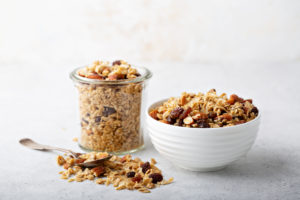 Eat more fiber and experience a lower risk for stroke. That seems to be the result of a recently published study.
Eat more fiber and experience a lower risk for stroke. That seems to be the result of a recently published study.
It looks like the more fiber a person eats each day, the less likely they are to experience an ischemic stroke. For every 10 grams of fiber a person eats, it could slash their stroke risk by 23%.
Advertisement
So, if you’re hitting the daily recommended intake of 28-38 grams per day, you could be cutting your risk by nearly as much as 92%. Fiber has been shown to reduce ischemic stroke risk by removing LDL build-up along arterial walls and promoting better blood flow.
LDL cholesterol is the “bad” cholesterol and a major risk factor for heart attack and stroke.
The study looked at diet and the associated risks for both ischemic and hemorrhagic stroke. Ischemic strokes, which represent 85% of stroke cases, occur from blockages in a blood vessel. Hemorrhagic strokes involve blood vessel bleeding.
Following more than 418,000 people, researchers found that people with higher intake of fruit, vegetables, whole grains, milk, cheese, and yogurt had a much lower risk of ischemic stroke, yet it had no impact on hemorrhagic stroke risk.
What’s cool was that it didn’t seem to matter what type of fruit, or fiber, people ate—just that they did.
Advertisement
That means there is plenty of freedom if you’re looking to build a stroke prevention diet. If you want to look at more high-fiber food options, however, some good choices include:
- Apples
- Pears
- Blueberries
- Oats
- Beans
- Whole wheat bread and grains
- Nuts
Optimizing fiber intake is another thing to pay attention to. It is best absorbed when consumed with water and taken intermittently throughout the day. Including five to eight grams each time you eat is ideal and can help you reach 28g (for women) or 38g (men) easily.
Fiber will likely provide more benefits than just a lower stroke risk. It is known for improving blood pressure, digestion, and gut health. Correcting imbalances in gut health and improving the population of gut flora can have a multitude of wide-ranging benefits.
